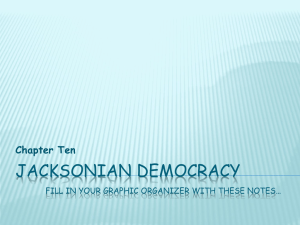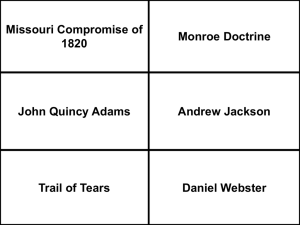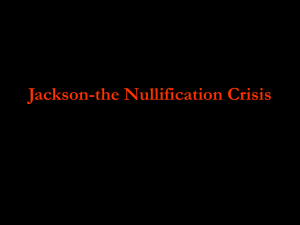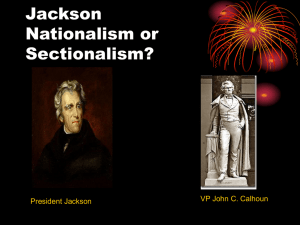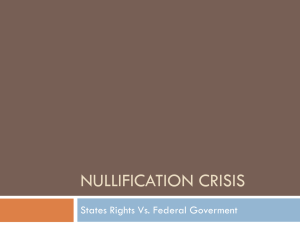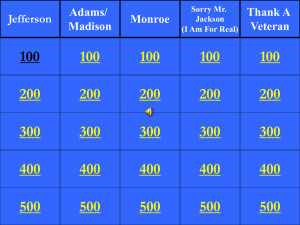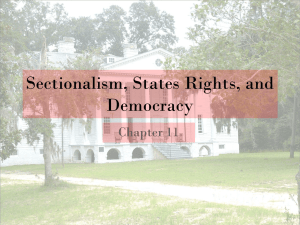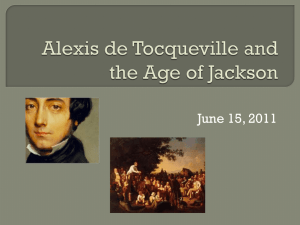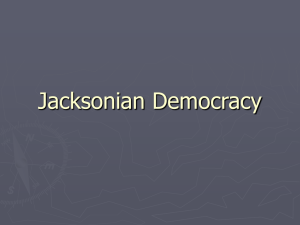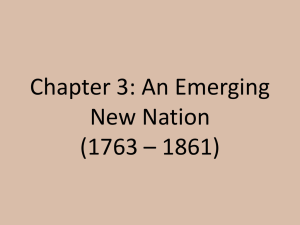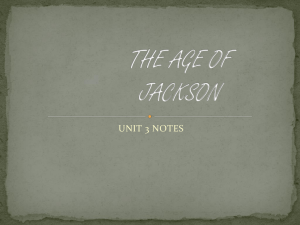File
advertisement
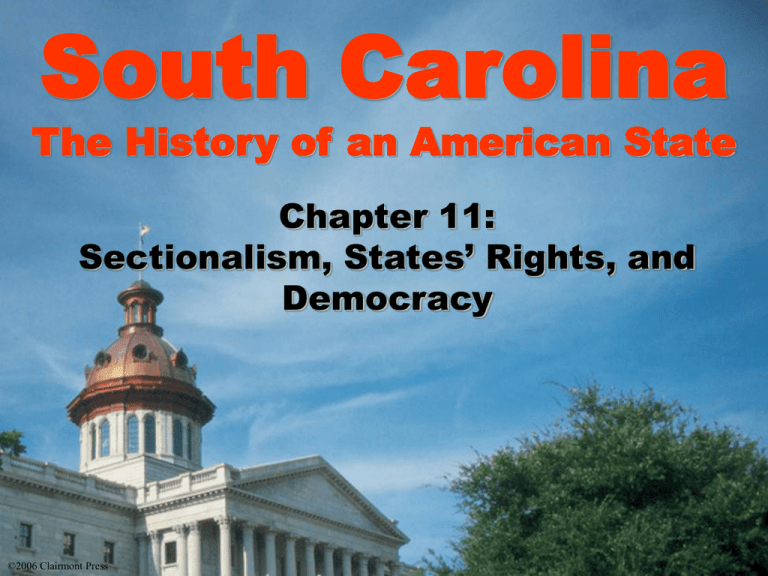
South Carolina The History of an American State Chapter 11: Sectionalism, States’ Rights, and Democracy ©2006 Clairmont Press South Carolina The History of an American State Chapter 11: Sectionalism, States’ Rights, and Democracy Section 1: Sectionalism Section 2: States’ Rights and Democracy Section 1: Sectionalism Essential Question • How did sectional differences affect the American people after the War of 1812? Section 1: Sectionalism What terms do I need to know? • sectionalism • free state • slave state • Missouri Compromise • caucus • mud-slinging • platform • spoils system US Presidents in Order A Southern Personality • sectionalism: extreme loyalty to one’s region instead of the country as a whole • Many southerners developed the myth that they were descended from important and wealthy English families – northerners were thought to be from poor Puritans • Planters were described as noble and honorable • Southern ladies were described as pure and proper • The myth described slaves as loyal and childlike • Many southerners encouraged the idea that their experiences were different from the northern ones Growing Differences • Differences with the north included: vegetation, climate, soil, and land regions – created differences in experiences and economies • Southern states mostly farmers – cash crops (rice, tobacco, cotton) important to economy • Rural southerners did not want or need a strong national government in their lives • Northern states grew rapidly – immigrants poured into the region working in new factories • Slavery was a big difference in the regions – legal in the south but not in the north Growing Differences • Invention of cotton gin caused increase in number of slaves • Planters could make lots of money planting cotton using the gin with slave labor • In S.C., Up Country and Low Country citizens worked to improve transportation and develop a huge cotton industry across the state • The number of slaves in S.C. more than doubled from 1790 to 1820 • More northerners began to speak out against slavery, but southerners felt they were being pushed around • As the country grew westward, a new section, “the West” added another side to America’s sectionalism The Missouri Compromise • In 1819, the numbers of slave and free states represented in the Senate were equal – no side could force the other on the slavery issue • Missouri wanted to enter the U.S.A. as a slave state – northern states did not want this so Maine was allowed to enter as a free state to maintain balance • Also, slavery would not be allowed north of Missouri’s southern border • John C. Calhoun (S.C.) was for the compromise and as Secretary of War supported it to President Monroe • Charles Pinckney (S.C.) was in Congress and believed that the states should decide the slavery issue for themselves The Election of 1824 • Issues in S.C. were falling cotton prices and slave revolts • Calhoun wanted to run for president, but many in S.C. believed he did not pay enough attention to his state and region • John Quincy Adams was elected president; Calhoun was elected Vice President • Andrew Jackson lost the election and was bitter – began campaigning for 1828 election A Split in the Republican Party • The fight for president split the Republicans • National Republicans: President Adams and his supporters • Democratic-Republicans: Andrew Jackson and his supporters • Jackson was seen as a “common man”; however, he was a wealthy planter • Jackson worked to get support from uneducated, average men – talked against “the rich” • Jackson won the 1828 election, but John C. Calhoun (S.C.) remained as vice president Brain Pop - Andrew Jackson The People’s Government • As president, Jackson wanted all men to have the right to vote, not just property owners • Democrats had a new kind of campaign – barbecues, parades, rallies, and “mud-slinging” • spoils system: appointing people to jobs in the government based on their loyalty not their experience or qualifications • “kitchen cabinet”: friends of Jackson who had no government job but served as unofficial advisors • “King Andrew”: name given to Jackson because he tended to do what he wanted to do • Calhoun became his bitter enemy and resigned as vice president Section 2: States’ Rights and Democracy Essential Question • How did economics play a role in people’s attitudes towards government? Section 2: Growing Tensions in the Colonies What terms do I need to know? • treason • Nullifiers • Unionists • capital • test oath The Nullification Crisis • Calhoun believed strongly in states’ rights – Jackson believed in a strong national government • National tariff (1816): tax on foreign goods to make it cheaper to buy American products • The tariff caused prices in S.C. to rise over time and did not increase the amount of manufacturing jobs • Great Britain did not like the tariff and threatened to stop importing cotton from S.C. • Calhoun wrote The South Carolina Exposition and Protest – it said the states could nullify a tariff by special convention A National Debate on Nullification • By 1830, the senate was having tough debates about states’ rights and the power of the federal government • Southerners believed that a state could nullify (cancel) any federal law or even secede (leave) the Union • President Jackson was against nullification • Vice-President Calhoun believed that nullification was an option for the states South Carolina and Nullification • Nullifiers: people who believed in the nullification option (known as States Rights & Free Trade party) • Unionists: States Rights & Union Party in S.C. • Nullifiers won most of the seats in the 1832 S.C. General Assembly – had enough votes to nullify the tariff • General Assembly voted to ignore the tariff and to secede if the federal government tried to force them to collect the tax • President Jackson prepared to send troops to S.C. • Senators worked out a compromise in 1833 before any shots were fired The Second Bank of the United States • Bank that held the nation’s money • It made loans and tried to regulate state’s banks • Jackson did not like the bank and did not allow it to stay open – moved government money to state banks • Without the national bank, many other banks lost the ability to do business and failed – “Panic of 1839” • 1839: economic depression – in S.C. many farmers lost their farms • Price of cotton fell and did not recover • People blamed President Van Buren for the depression even though it was Jackson who created the problems Opposition to Jackson • Whig party started to oppose Jackson • S.C. Nullifiers worked to destroy the Unionists • test oath: candidates would be required to swear an oath of loyalty to the nation – Nullifiers wanted an oath to S.C. to be above the U.S. • Calhoun grew more powerful in S.C. controlling most state politics • The Whig party lasted only until the Civil War
